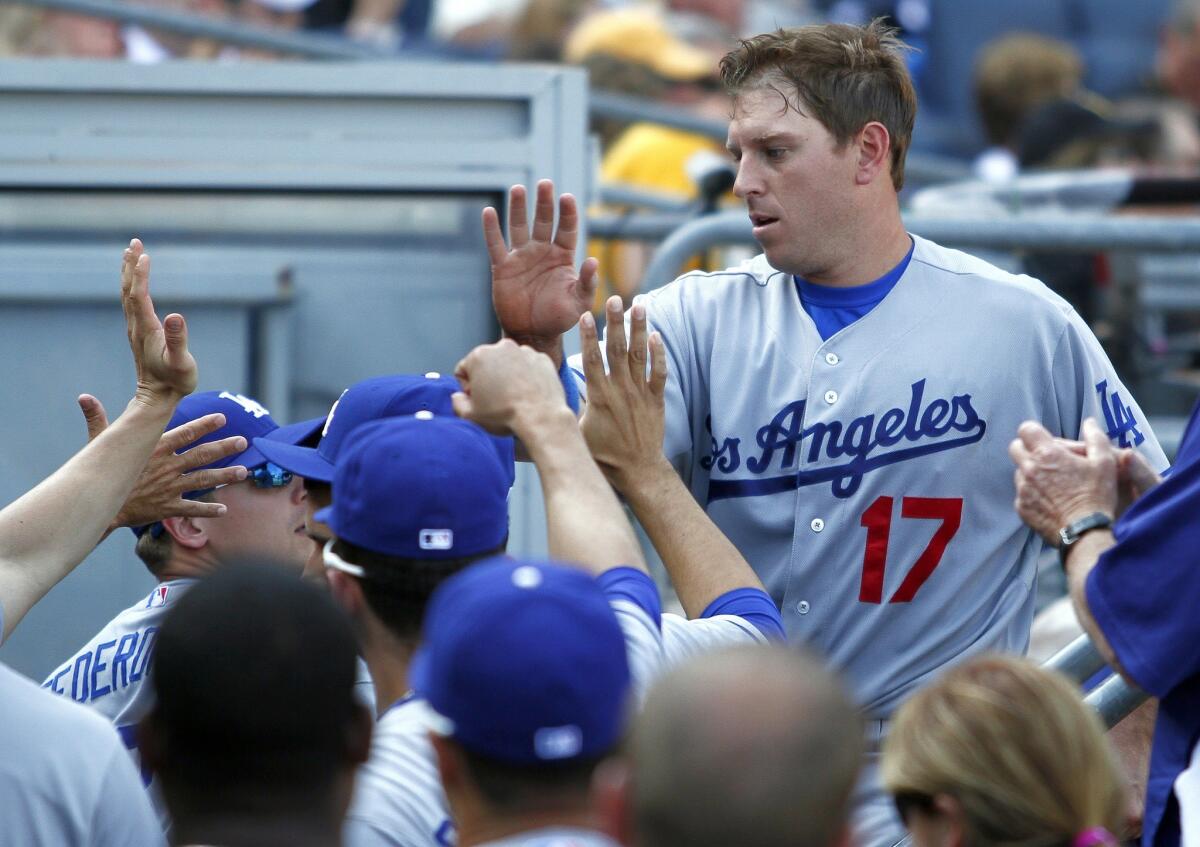A.J. Ellis fought to get to the majors

It happened one time too many. For four years, A.J. Ellis had bounced up and down between the minors and the big club. Finally, right after the 2011 the All-Star break, Ellis could take it no more.
He was 30 when sent back to triple-A Albuquerque after the Dodgers activated Rod Barajas off the disabled list. Ellis felt he was ready and feared opportunity closing. He was the consummate team player, but he marched into Manager Don Mattingly’s office.
“I was hot,” Ellis said. “I told Donnie that he was making a bad decision. And this team was all about winning and this was definitely not the right decision.”
Mattingly hardly took offense. He respected Ellis’ fire and determination.
“I thought it was a turning point for him,” Mattingly said. “It was the first time he said, ‘Hey, I’m the one who belongs here.’ That kind of tells you he believes in himself. It was a good sign.”
After getting talked down by minor league catching coordinator Travis Barbary, Ellis calmed down and reported to Albuquerque.
Five weeks later the Dodgers designated struggling catcher Dioner Navarro for assignment and recalled Ellis. He’s been up ever since.
In 2012 he was named their starting catcher. At age 31, Ellis had finally made it. He hit .270 last season, adding some surprising power (13 home runs, 52 runs batted in) while giving the Dodgers consistent defensive play behind the plate.
Now he’s a veteran, if one in only his second full season.
“I don’t know if I feel like a veteran major leaguer,” he said. “One thing that’s been nice about my struggle and fight to get here, I don’t take this for granted.
“I don’t want to ever feel like I’ve arrived or I’ve made it. As long as it took me to get here, I know how quickly it can all be taken away.”
Ellis had minor knee surgery last off-season but returned to spring camp for the first time as the team’s undisputed No.1 catcher. After nine seasons spent mostly in the minors, Ellis had arrived.
He said there never was a time when he seriously considered packing it in and selling life insurance.
“Fortunately, my wife [Cindy] wouldn’t let me,” he said. “She was always my biggest supporter. The one saying, ‘You’re going to make it.’ ”
This season his offensive numbers are slightly down (.246, three homers, 16 RBIs), though he spent two weeks on the disabled list with an oblique strain.
“Offensively it’s been subpar,” Ellis said. “I’m just not squaring the ball up like I did last year. There’s definitely more in there. I have a high standard for myself. I want to be a contributor on this team on both sides of the ball.”
Defensively he continues to grow. Aided by a pitching staff that takes pride in holding runners close, Ellis has thrown out 18 of 34 bases stealers. He’s the only catcher with at least 430 innings who’s thrown out over half of his runners (53%).
Ellis credits the tutelage of catching instructor Steve Yeager and bullpen catcher Rob Flippo for working on his technique and approach.
“He’s better this year than he was last year,” Yeager said. “He has a reputation of being a good game-caller. He has the respect of the pitching staff. He has the respect of his teammates. He goes out there and he goes as hard as he can every day. He’s a leader.”
Yeager credits Ellis’ long battle to get here for shaping his worth ethic.
“I think that has a big deal to do with it,” he said. “He waited a long time to get here and he’s not going to go away easily. He’s going to battle. He battled his whole minor league career to get here. And you can bet he’s going to battle up here.”
More to Read
Are you a true-blue fan?
Get our Dodgers Dugout newsletter for insights, news and much more.
You may occasionally receive promotional content from the Los Angeles Times.










